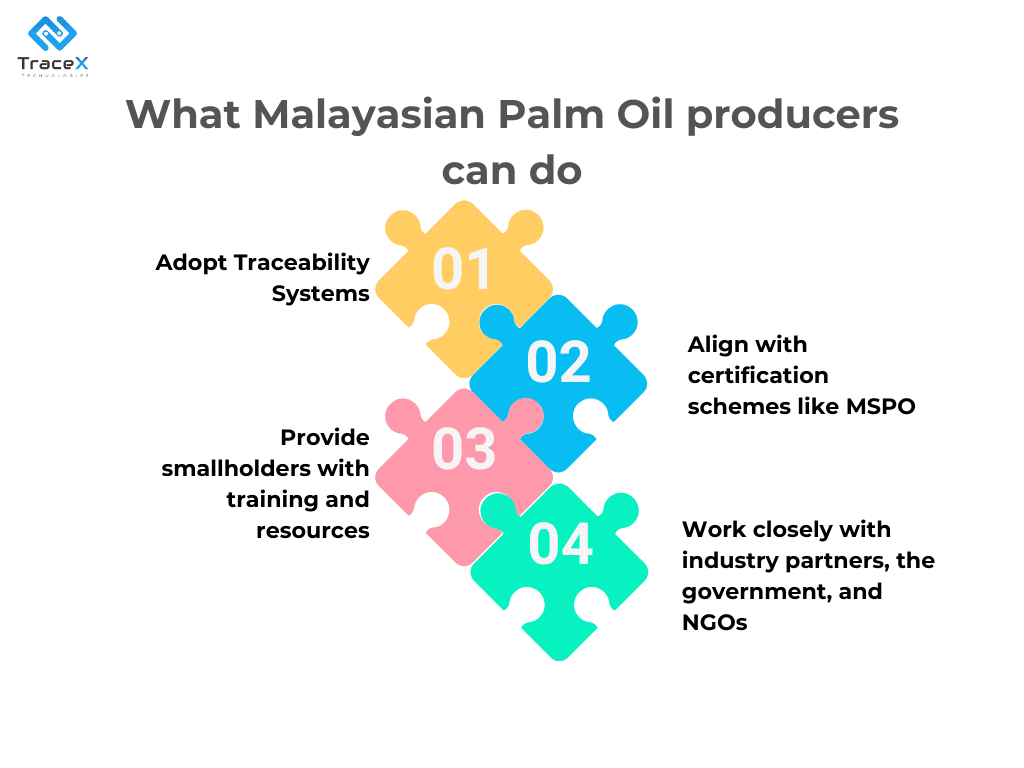Contact: +91 99725 24322 |
Menu
Menu
Quick summary: Explore how Malaysian palm oil companies can navigate the challenges of EU Deforestation Regulation (EUDR) compliance. Learn about key issues, solutions, and best practices to ensure a deforestation-free supply chain and meet stringent EU requirements effectively.

Malaysia’s palm oil industry stands at a crossroads, facing the significant challenge of complying with the EU’s Deforestation Regulation (EUDR). As global scrutiny on deforestation intensifies, producers are grappling with the complex task of proving their products are deforestation-free. The stakes are high: without compliance, Malaysian palm oil risks losing access to one of its most crucial markets—the European Union.
The oil palm sector is a cornerstone of the Malaysian economy and is essential in supplying food and energy to an expanding worldwide population
For many, especially smallholders, the costs of implementing new traceability systems and adapting to rigorous requirements can be overwhelming.
Key Takeaways
Palm oil is more than just an agricultural product for Malaysia. It is the country’s second-largest export, generating billions in revenue annually. Beyond that, it’s a livelihood for smallholders, who constitute over 40% of Malaysia’s palm oil producers.
However, this industry comes with its environmental challenges. Palm oil production has been linked to deforestation, loss of biodiversity, and significant greenhouse gas emissions, leading to growing global concerns.
Malaysia has already taken steps to address these concerns, such as the Malaysian Sustainable Palm Oil (MSPO) certification scheme. But with the EU’s introduction of the EUDR, there’s an increasing demand for more transparency and sustainability in the entire supply chain.
The European Union Deforestation Regulation (EUDR) aims to ensure that commodities, including palm oil, entering the EU market are not linked to deforestation, whether legal or illegal. The regulation applies to key industries like soy, coffee, cocoa, and, notably, palm oil.
The regulation mandates companies to prove that their products do not contribute to deforestation by providing traceable, verified supply chain data. In essence, businesses must map their supply chains and provide geolocation data to ensure that no deforestation occurs after December 31, 2020, in the areas where their raw materials are sourced.
For Malaysian palm oil producers, the EUDR brings significant challenges, particularly for smallholders who may lack the resources to implement stringent traceability and reporting systems.
While the challenges are significant, they are not insurmountable. Malaysia’s palm oil industry can take concrete steps to ensure EUDR compliance and safeguard its access to the EU market.
Blockchain technology and digital traceability platforms can play a vital role in helping palm oil producers comply with the EUDR. By recording and verifying every step in the supply chain, these platforms offer a transparent and tamper-proof record of palm oil’s journey from plantation to market.
Digital platforms allow producers to provide the required geolocation data, sustainability assessments, and certification processes in real-time. Additionally, satellite monitoring can ensure real-time tracking of land use, providing verification that no deforestation has occurred post-2020.
The Malaysian Sustainable Palm Oil (MSPO) certification offers a solid foundation for compliance with EUDR. Already in place to ensure responsible and sustainable practices, MSPO can be aligned with the EUDR’s stricter requirements through more rigorous traceability mechanisms.
Malaysia can leverage the MSPO certification to demonstrate its commitment to sustainable palm oil production, while encouraging more producers—especially smallholders—to get certified.
It is crucial that smallholders, who play a pivotal role in the palm oil supply chain, receive adequate support to meet EUDR requirements. Collaborative efforts from governments, private enterprises, and NGOs can provide financial assistance, technical training, and access to digital tools.
By empowering smallholders with the resources they need to adopt sustainable practices and report on their activities accurately, the entire supply chain can move closer to EUDR compliance.
The Malaysian government, together with industry stakeholders, can take the lead in developing clear guidelines, offering subsidies for compliance costs, and fostering partnerships with international organizations to facilitate adherence to EUDR.
Failing to meet the EUDR requirements could have long-lasting repercussions for Malaysian palm oil. However, by embracing sustainability and investing in new technologies, industry can turn this challenge into an opportunity.
Complying with the EUDR will not only secure continued access to the EU market but also position Malaysia as a global leader in sustainable palm oil production. Moreover, producers who meet these high standards will likely gain a competitive edge in other markets that increasingly demand eco-friendly and deforestation-free products.

TraceX’s EUDR compliance platform can assist Malaysian companies in ensuring full traceability across the supply chain for EUDR (EU Deforestation Regulation) compliance.
In the first mile of the supply chain, which involves sourcing raw materials directly from producers (like farmers or plantations), TraceX’s platform can help in:
For the middle mile, which encompasses the transportation and processing stages, TraceX’s platform offers:
In the last mile, which includes the final delivery and distribution of products to retailers or consumers, TraceX’s platform supports:
The EUDR compliance for Malaysia’s palm oil industry presents both challenges and opportunities. While compliance may seem daunting, the future of the industry depends on its ability to adapt to global sustainability standardsx.
By embracing traceability, supporting smallholders, and leveraging technological solutions, Malaysia can ensure its palm oil remains a key player in the global market while safeguarding the environment for future generations.
Ready to take the next step in sustainable palm oil production? It’s time to embrace traceability and transparency.
By creating a sustainable palm oil industry, Malaysia not only safeguards its economic future but also leads the charge in global environmental responsibility.
Malaysian palm oil companies face several challenges with EUDR compliance, including verifying the deforestation-free status of their supply chains, managing complex traceability requirements, and demonstrating compliance across multiple tiers of the supply chain. These challenges are compounded by the need for accurate and comprehensive data on the origin and journey of palm oil products.
TraceX’s EUDR compliance platform can help Malaysian palm oil companies by providing end-to-end traceability, from the source of palm oil to the final product. It offers blockchain-based verification, real-time monitoring, and comprehensive reporting tools to ensure that all supply chain stages adhere to EUDR regulations. This technology enables companies to demonstrate compliance, mitigate risks, and improve transparency.
To prepare for EUDR compliance, Malaysian palm oil companies should start by mapping their entire supply chain to identify and verify all sources of palm oil. Implementing robust traceability systems can help in monitoring and documenting deforestation-free practices. Additionally, companies should engage with stakeholders to ensure that all tiers of their supply chain are aligned with EUDR requirements and prepare for regular audits and reporting.
